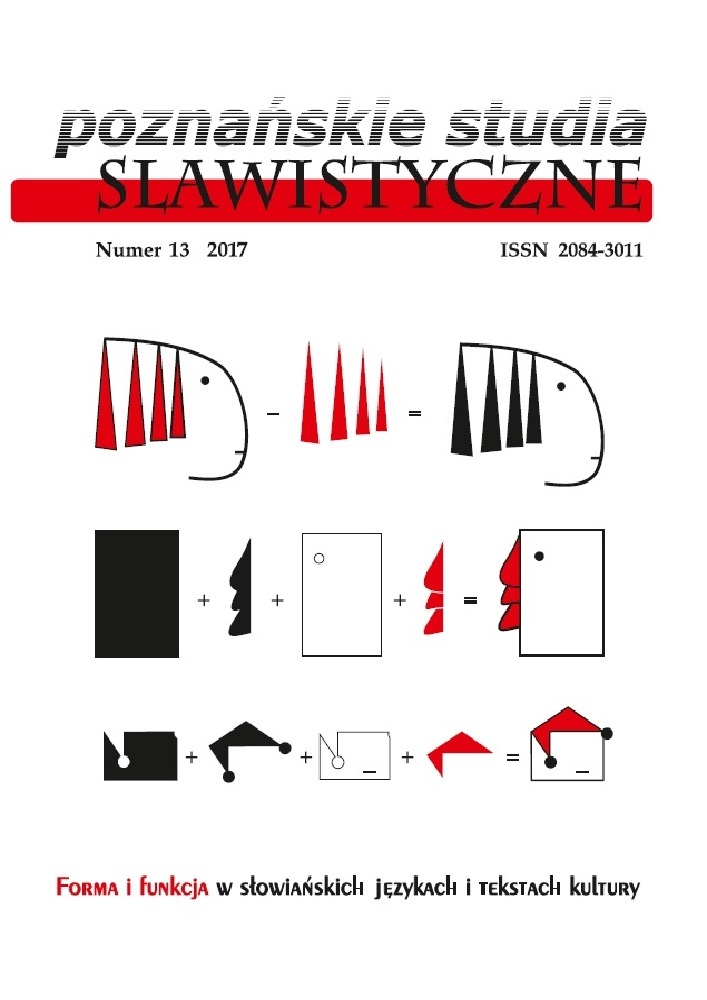Abstrakt
The article focuses on one of the major mysteries concealed in Fyodor Dostoevsky’s oeuvre up to the present day, namely the main cause of a double murder committed by Raskolnikov in Crime and Punishment. I present selected scholarly interpretations of Raskolnikov’s deed, some of them being already classical and ever inspiring for subsequent readings of the novel, some using extremely persuasive argumentation on one of Raskolnikov’s possible motives. Each of these readings becomes an object of my commentary and critical assessment as I indicate those fragments in Dostoevsky’s novel which undermine their claim to provide an ultimate solution of Raskolnikov’s reason for crime. This presentation leads to the conclusion that Crime and Punishment is unusually open for interpretations, which probably have more to say about the philosophical identity of their authors rather than about Dostoevsky’s intentions in creating his famous protagonists. Eventually I claim that the novel’s main secret – Raskolnikov’s motive for murder – is never to find its one, satisfactory explanation and that this is what makes a literary work a true, immortal masterpiece.Bibliografia
Bačinin, V.A. (2001). Dostoevskij: metafizika prestupleniâ (Hudožestvennaâ fenomenologiâ russkogo protomoderna). Izdatel’stvo Sankt-Peterburgskogo Universiteta. Sankt-Peterburg: Izdatel’stvo Sankt-Peterburgskogo Universiteta.
Beebe, M. (1955). The Three Motives of Raskolnikov. The Reinterpretation of Crime and Punishment. „College English”, nr 3, vol. 17, s. 151–158.
https://doi.org/10.2307/495737
Dostoevskij, F.M. 1972–1990, Polnoe sobranie sočinenij v 30 tomah, t. VI. Leningrad: Nauka (Leningradskoe otdelenie).
Dostojewski, F.M. (2002). Zbrodnia i kara. Przeł. J.P. Zajączkowski. Warszawa: Wydawnictwo Sara.
Evlampiev, I.I. (2012). Filosofiâ čeloveka v tvorčestve F. Dostoevskogo (ot rannih proizvedenij k „Brat’âm Karamazovym”). Sankt-Peterburg: Izdatel’stvo PHGA.
Kasatkina, T.A. (1996). Harakterologiâ Dostoevskogo. Tipologiâ èmocional’no-cennostnyh orientacij. Moskva: Nasledie.
Kirpotin, V.Â. (1970). Razočarovanie i krušenie Rodiona Raskol’nikova: kniga o romane F.M. Dostoevskogo „Prestuplenie i nakazanie”. Moskva: Sovetskij Pisatel’. http://scribble.su/work/kak/84.html. 5.05.2016.
Kliger, I. (2010). Shapes of History and the Enigmatic Hero in Dostoevsky: The Case of „Crime and Punishment”. „Comparative Literature”, nr 3, vol. 62, s. 228–245.
https://doi.org/10.1215/00104124-2010-012
Krajewska, A. (2015). Przestrzenie performatywne. „Przestrzenie Teorii”, nr 24, s. 7–9.
Kroeker Travis, P., Ward, B.K. (2001). Remembering the End. Dostoevsky as Prophet to Modernity. Boulder: Westview Press.
Kruszelnicki, M. (2017). Bracia Karamazow – nieczysta hosanna Dostojewskiego. „Slavia Orientalis”, nr 1, s. 7–29.
Lantz, K.A. (2004). The Dostoevsky Encyclopedia. London: Greenwood Press.
Leatherbarrow, W.J. (2005). A Devil’s Vaudeville. The Demonic in Dostoevsky’s Major Fiction. Evanston: Northwestern University Press.
https://doi.org/10.2307/j.ctv43vtk2
McReynolds, S. (2008). „You Can Buy the Whole World”: The Problem of Redemption in the Brothers Karamazov. „The Slavic and East European Journal”, nr 1, vol. 52, s. 87–111.
Mejer, G.A. (1967). Svet v noči (O „Prestuplenii i nakazanii”). Opyt medlennogo čteniâ. Frankfurt na Majne: Posev.
Meletinskij, E.M. (2001). Zametki o tvorčestve Dostoevskogo. Moskva: RGGU.
Mochulsky, K. (1967). Dostoevsky. His Life and Work. Przeł. M.A. Minihan. Princeton: University Press.
Morris, V.B. (1984). Fyodor Dostoevsky’s Crime and Punishment. New York: Barron’s Educational Series.
Nabokov, V. (1981). Lectures on Russian Literature. Red. i wstęp F. Bowers. New York: Harcourt Press Jovanovich.
Nietzsche, F. (1911). Wola mocy. Próba przemiany wszystkich wartości (studya i fragmenty). Przeł. S. Frycz, K. Drzewiecki. Warszawa: Nakład Jakuba Mortkowicza.
Nuttal, A.D. (2004). The Intellectual Problem II. W: Fyodor Dostoevsky’s Crime and Punishment. Red. H. Bloom. New York: Chelsea House.
Offord, D. (2006). Crime and Punishment and Contemporary Radical Thought. W: Fyodor Dostoevsky’s Crime and Punishment. A Casebook. Red. R. Peace. Oxford: Oxford University Press.
Pomeranc, G. (1990). Otkrytost’ bezdne. Vstreči o Dostoevskim. Moskva: Sovetskij Pisatel’.
Przybylski, R. (2010). Dostojewski i „przeklęte problemy”. Warszawa: Wydawnictwo Sic!
Rahv, P. (1962). Dostoevsky in Crime and Punishment. W: Dostoevsky. A Collection of Critical Essays. Red. R. Wellek. New York: Prentice-Hall.
Schur, A. (2012). Wages of Evil. Dostoevsky and Punishment. Evanston: Northwestern University Press.
Shneidman, N.N. (1975). Soviet Theory of Literature and the Struggle Around Dostoevsky in Recent Soviet Scholarship. „Slavic Review”, nr 3, vol. 34, s. 523–538.
https://doi.org/10.2307/2495563
Simmons, E. (1940). Dostoevsky. The Making of a Novelist. London: Oxford University Press.
Stepanân, K.A. (2010). Âvlenie i dialog v romanah F.M. Dostoevskogo. Sankt-Peterburg: Kriga.
Szestow, L. (2000). Dostojewski i Nietzsche. Filozofia tragedii. Przeł. i wstęp C. Wodziński. Warszawa: Czytelnik.
Szestow, L. (2003). Na szalach Hioba. Duchowe wędrówki. Przeł. J. Chmielewski. Warszawa: KR.
Vetlovskaâ, B.E. (1997). Analiz èpičeskogo proizvedeniâ. Logika položenij („Tot svet” v „Prestuplenii i nakazanii”). W: Dostoevskij. Materialy i issledovaniâ, t. 14. Red. G.M. Fridlender. Sankt-Peterburg: Nauka.
Licencja

Utwór dostępny jest na licencji Creative Commons Uznanie autorstwa – Bez utworów zależnych 4.0 Międzynarodowe.
